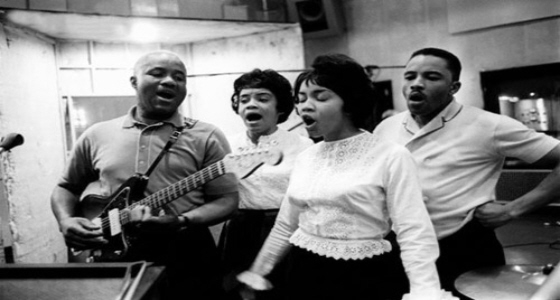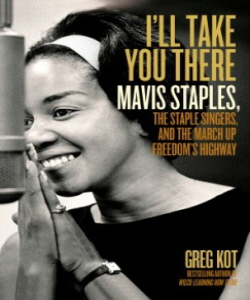
© Words - Stephen Deusner
ON A SUNDAY in April 1965, the Staple Singers — Roebuck “Pops” Staples and three of his children: Mavis, Cleotha, and Pervis — performed for a large congregation at New Nazareth Church on Chicago’s South Side. It was something of a homecoming for the family, who by that time were already stars on the gospel circuit and were touring the country, even the dangerously divided Deep South, almost constantly. A white producer named Billy Sherrill (later one of the top hitmakers in country music) recorded that performance and released it as a live album, Freedom Highway, that would become one of the Staples’ best and most popular releases.
 That show is notable for the debut of a new song called “Freedom Highway,” from which the album takes its title. It opens with a tangle of Pops’s bluesy guitar notes, spiky yet resonant in the sanctuary. With the entrance of a chugging rhythm section and some excitedly syncopated handclaps, the song launches into a rousing church-boogie groove that sounds almost too rambunctious for the setting. The vocals — half-shouted, half-sung — inject “Freedom Highway” with a sense of determined motion, as though the tempo is set not by the musicians themselves but by some outside force exhorting them onward. It might be God Himself, or it might be simply a shared sense of purpose. “Marching up freedom’s highway, marching each and every day!” the Staples sing in exuberant harmony, but one voice — that glorious baritone belonging to Mavis Staples — emerges to underscore the family’s fortitude: “Made up my mind, and I won’t turn around!”
That show is notable for the debut of a new song called “Freedom Highway,” from which the album takes its title. It opens with a tangle of Pops’s bluesy guitar notes, spiky yet resonant in the sanctuary. With the entrance of a chugging rhythm section and some excitedly syncopated handclaps, the song launches into a rousing church-boogie groove that sounds almost too rambunctious for the setting. The vocals — half-shouted, half-sung — inject “Freedom Highway” with a sense of determined motion, as though the tempo is set not by the musicians themselves but by some outside force exhorting them onward. It might be God Himself, or it might be simply a shared sense of purpose. “Marching up freedom’s highway, marching each and every day!” the Staples sing in exuberant harmony, but one voice — that glorious baritone belonging to Mavis Staples — emerges to underscore the family’s fortitude: “Made up my mind, and I won’t turn around!”What makes the performance so stirring, even to a listener in the Obama era, is its unbounded jubilation. The Staple Singers may have faced hostility and suspicion as African Americans, but their optimism would not be diminished. Like so many civil rights anthems, “Freedom Highway” helped to couch the movement within the church, to define freedom and equality as Christian virtues. Even as it reminded a seated congregation of their responsibilities outside the church, the song would remind marchers of the courage it would take to reach the end of their journey. “Keep on marching! Up freedom’s highway,” Pops preaches as the song reaches its conclusion and transitions fluidly into the next number in their set. Embedded in the lyrics and especially in the lively music is a sense of hope about the future: freedom is not some abstract idea far off in the future, but solid ground at the end of a gospel song.
This is the world Greg Kot depicts in his new book, I’ll Take You There: Mavis Staples, The Staple Singers, and the March Up Freedom’s Highway: -
In the New Nazareth Church concert, Pops connects the themes of gospel music and the civil rights movement more explicitly than ever before; it presents him not just as a musical innovator, but as a philosopher, preacher, and visionary, a melding of black church music and black popular music for a common cause. Church music was no longer just about making it through this world to get to the next one; it was also about living right now in the streets all African Americans shared.
© Los Angeles Review of Books – Used by Kind Permission - - - See more





